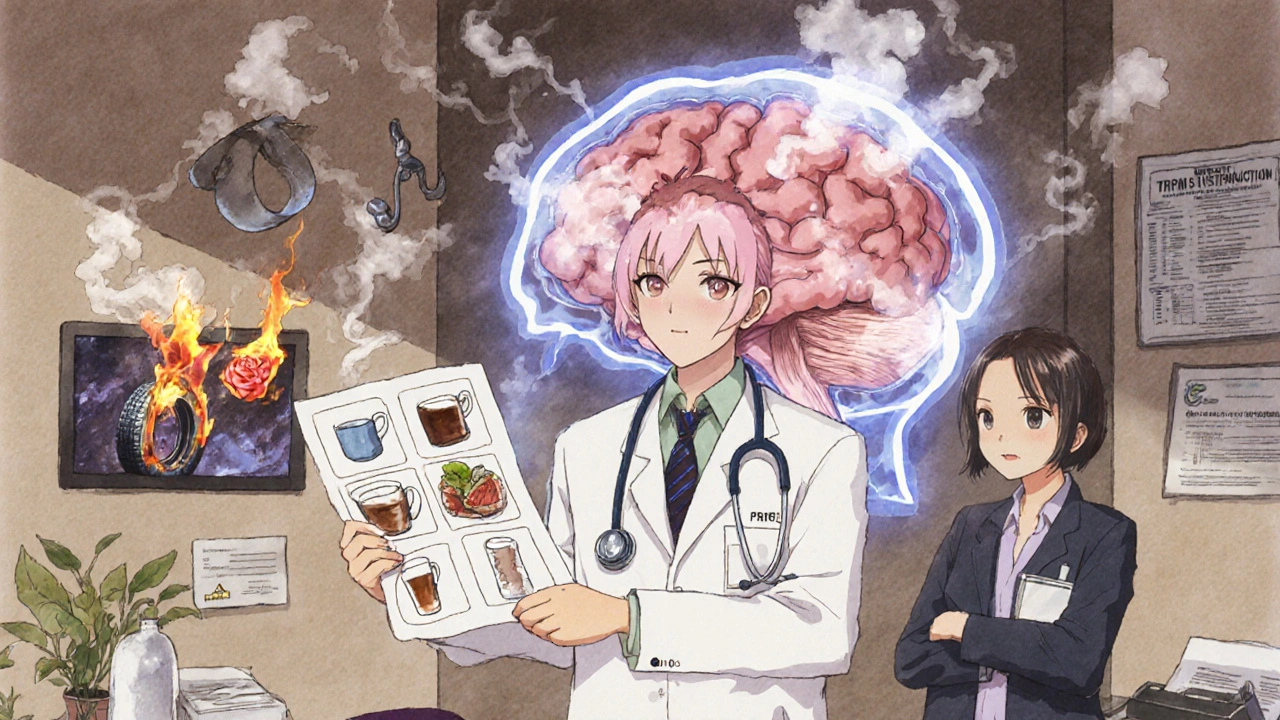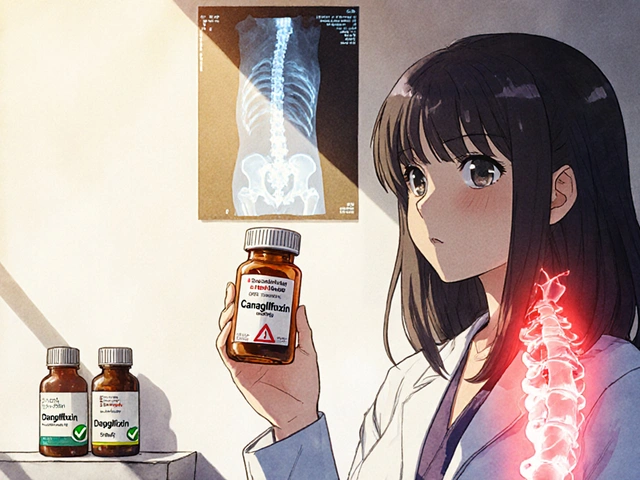Medication Risk Checker for Dysosmia
Check Your Medication Risk
Enter a medication name or select a category to see if it's associated with smell distortions.
Have you ever taken a medication and suddenly noticed that your favorite food tastes like metal, or that everything smells like burnt plastic? You’re not imagining it. This isn’t just a weird coincidence-it’s a real, documented side effect called dysosmia. It’s when your sense of smell gets distorted, making familiar scents turn unpleasant, or even making you smell things that aren’t there at all. And it’s more common than you think.
What Exactly Is Dysosmia?
Dysosmia isn’t just losing your sense of smell-that’s called anosmia. Dysosmia means your brain is misreading smells. Coffee might smell like gasoline. Bread might taste like rotten eggs. Or you could catch whiffs of cigarette smoke when no one is smoking. It’s not in your head. It’s in the way your olfactory system is reacting to a drug.
This isn’t rare. Over 500 medications are known to cause smell and taste distortions. The problem? Most doctors don’t ask about it. Patients often assume they’re going crazy or blame it on aging, when the real culprit is a pill they started taking weeks ago.
Which Medications Are Most Likely to Cause This?
Some drugs are far more likely to mess with your sense of smell than others. The biggest offenders fall into a few key categories:
- Antibiotics: Azithromycin, clarithromycin, doxycycline, levofloxacin, and moxifloxacin are top culprits. Fluoroquinolones like levofloxacin and moxifloxacin can chelate zinc and other minerals your smell receptors need to function. Macrolides like azithromycin interfere with calcium and magnesium levels in taste cells.
- Cardiovascular drugs: Midodrine, used for low blood pressure, has been linked to persistent metallic tastes. These drugs affect nerve signaling in the mouth and nose.
- Neurological medications: Carbamazepine (for seizures), baclofen (for muscle spasms), and even some antidepressants like sertraline can alter how smell signals are processed in the brain.
- Endocrine drugs: Carbimazole (for thyroid issues) and tolbutamide (for diabetes) have also shown up in case studies.
Interestingly, the route matters. IV drugs like lidocaine or iron infusions can trigger a metallic taste within minutes. Oral pills? Symptoms usually show up after 7 to 14 days of use.
Why Does This Happen?
It’s not just one mechanism-it’s several. Medications can interfere with smell in different ways:
- Blocking receptors: Some drugs bind to odor receptors in your nose and stop them from working properly.
- Disrupting signaling: Others mess with G-proteins, TRPM5 channels, or calcium flow-tiny molecular switches that tell your brain what you’re smelling.
- Sticking receptors on: In dysosmia, receptors sometimes don’t turn off. They keep firing, even when there’s no smell. That’s why you smell smoke or garbage all the time.
- Damaging cells: Some drugs kill or slow down the turnover of olfactory neurons. These cells regenerate every 30 to 60 days. If that cycle gets disrupted, your smell system can’t reset.
One study showed sertraline can actually slip into the fatty membranes of smell cells and change how they behave. It’s not just about the drug’s intended target-it’s about where else it ends up.

How Bad Can It Get?
It’s not just annoying-it’s life-altering.
Up to 30% of people with medication-induced dysosmia lose significant weight because food becomes unpalatable. One woman on levofloxacin lost 8 pounds in three weeks because everything tasted like bile. Another Reddit user lost 15% of their body weight over four months after azithromycin, unable to eat anything without it tasting like rotten eggs.
Some people can’t smell smoke, gas leaks, or spoiled food. That’s not just inconvenient-it’s dangerous. And because the brain adapts to the distortion, symptoms can linger for months-even after stopping the drug.
Studies show 65% of people improve within 4 weeks of stopping the medication. But 22% need more help. And 1 in 5 cases last longer than 6 months.
What Can You Do?
If you suspect a medication is causing smell changes, don’t panic-but don’t ignore it either.
- Track your symptoms: Note when they started, what smells changed, and what you’re eating. Did it begin within two weeks of starting a new pill?
- Don’t stop cold turkey: Especially with antibiotics, blood pressure meds, or seizure drugs. Talk to your doctor first.
- Ask for a smell test: The University of Pennsylvania Smell Identification Test (UPSIT) is a 40-item test that can confirm if your sense of smell is impaired. It’s quick, non-invasive, and often overlooked.
- Consider alternatives: If you’re on azithromycin for a mild infection, maybe amoxicillin is an option. Your doctor might be able to switch you to a drug with a lower risk of chemosensory side effects.
There’s no magic cure. Zinc supplements? Some people swear by them, but experts warn they can cause copper deficiency and don’t work for everyone. Theophylline, magnesium, or even low-dose mirtazapine (an antidepressant) have helped in isolated cases. But these aren’t one-size-fits-all.

Why Isn’t This Better Known?
Here’s the ugly truth: smell and taste changes aren’t mandatory to report in most drug safety systems. No one tracks them like they track liver damage or rashes. So the data is scattered, underreported, and often ignored.
A 2022 survey found only 37% of primary care doctors routinely ask patients about smell changes when reviewing meds. But 78% of ENT specialists do. That’s a huge gap.
Dr. Devyani Lal at the University of Arizona says it best: “Patients don’t volunteer this. Doctors don’t ask. So it slips through the cracks.”
What’s Changing?
Things are slowly improving.
The FDA now encourages drug makers to include smell and taste outcomes in clinical trials. AstraZeneca even patented a compound in 2022 aimed at treating drug-induced smell loss. The European Medicines Agency plans to require smell assessments in phase III trials for antibiotics and heart drugs starting in 2024.
A global registry launched in 2023 already has over 1,200 patients enrolled. And researchers are testing new drugs that target TRPM5 channels-tiny proteins in smell cells that go haywire with certain meds. Phase II trials are underway.
This isn’t just about taste. It’s about safety, dignity, and quality of life. If you can’t smell your child’s hair or your morning coffee, that’s not just a side effect-it’s a loss.
What Should You Do Next?
If you’re experiencing smell changes after starting a new medication:
- Write down the name of the drug and when you started it.
- Describe the smell changes: Is it metallic? Rotten? Like smoke? Constant?
- Check if the drug is on the known list (antibiotics, blood pressure meds, seizure drugs).
- Call your doctor. Say: “I think this medication is changing how I smell. Can we look into it?”
- Ask if you can be referred to an ENT or a smell and taste clinic. The Smell and Taste Treatment and Research Foundation has a directory.
Don’t wait. Don’t assume it’s temporary. And don’t let anyone tell you it’s “all in your head.” It’s real. It’s documented. And it’s treatable-if you speak up.
There’s hope. Many people recover fully. Some need time. Others need a switch in meds. But no one should have to live with food tasting like garbage because a pill messed with their nose.
Can antibiotics cause long-term smell loss?
Yes. While most cases resolve within 3 months of stopping the antibiotic, about 22% of people experience persistent dysosmia lasting longer than 6 months. Fluoroquinolones like levofloxacin and macrolides like azithromycin are most commonly linked to long-lasting symptoms. The damage isn’t always permanent, but recovery can take months and sometimes requires specialized treatment.
Is dysosmia the same as anosmia?
No. Anosmia means you can’t smell anything at all. Dysosmia means you smell things-but they’re wrong. You might smell smoke when there’s none, or coffee might taste like metal. It’s a distortion, not a loss. Both can be caused by medications, but they’re different conditions with different treatments.
Can zinc supplements fix medication-induced smell changes?
Not reliably. While zinc deficiency can cause smell problems, most medication-induced dysosmia isn’t caused by low zinc. Taking extra zinc won’t fix distorted signals from drugs like levofloxacin or carbamazepine. In fact, excessive zinc can lead to copper deficiency, which causes its own neurological issues. Only use zinc under a doctor’s supervision if testing confirms a deficiency.
Why do some people get dysosmia and others don’t?
We don’t fully know. Genetics likely play a role-some people have smell receptors that are more sensitive to certain drugs. Age, prior infections, and existing nerve damage can also increase risk. But there’s no reliable way to predict who will be affected. That’s why it’s so important to report any changes, even if you think you’re “just lucky.”
Should I stop my medication if I notice smell changes?
No-not without talking to your doctor. Stopping antibiotics or blood pressure meds suddenly can be dangerous. Instead, document your symptoms, note the timing, and schedule a conversation. Your doctor may be able to switch you to a different drug with a lower risk of smell side effects, or monitor you closely while you continue treatment.
Are there any new treatments being developed?
Yes. Researchers are testing drugs that target TRPM5 channels, which are often disrupted by medications like fluoroquinolones. Phase II clinical trials are underway (NCT05214345). There’s also growing interest in GABA-ergic and dopaminergic agents to reset abnormal smell signals. While nothing’s approved yet, the field is moving toward mechanism-based treatments instead of guesswork.
Don’t let a medication steal your sense of smell. Speak up. Ask questions. And know that you’re not alone-thousands of others are experiencing this too. With awareness, better screening, and smarter prescribing, this side effect doesn’t have to be a silent burden.






Rachel Whip
November 25, 2025 AT 21:10